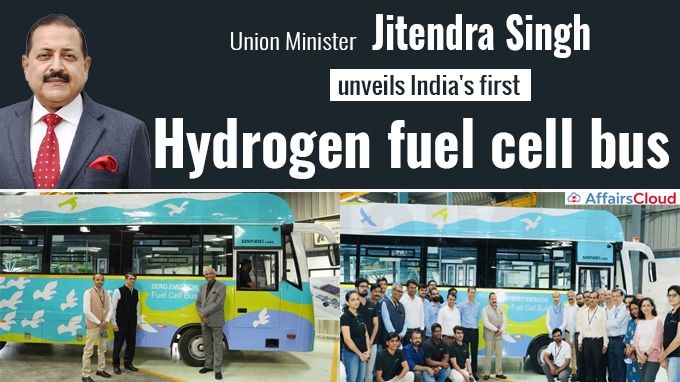
On August 21, 2022, Union Minister of State (MoS-Independent Charge) Dr Jitendra Singh, Ministry of Science & Technology (MoST) launched India’s first indigenously developed Hydrogen Fuel Cell Bus in Pune (Maharashtra).
- It is co-developed by the Council of Scientific and Industrial Research (CSIR)-National Chemical Laboratory (NCL), Central Electrochemical Research Institute (CSIR-CECRI), and KPIT Technologies Limited, an Indian multinational corporation headquartered in Pune, Maharashtra.
- This development is inspired by the National Green Hydrogen Mission.
Key Points:
i.The fuel cell utilizes Hydrogen and Air to generate electricity to power the bus, producing only heat and water in the process.
- This makes the bus possibly the most environmentally friendly mode of transportation.
- They also give zero Green-House Gas (GHG) emissions.
ii.Currently, a single diesel bus plying on long distance routes typically emits 100 tons of Carbondioxide (CO2) annually and there are over a million such buses in India.
iii.The high efficiency of fuel cell vehicles and the high energy density of hydrogen ensures that operational costs in rupees per kilometre for fuel cell trucks and buses are lower than diesel powered vehicles.
iv.About 12-14% CO2 emissions and particulate emissions come from diesel powered heavy commercial vehicles.
How is electricity produced through Hydrogen fuel cells?
Hydrogen fuel cells like the one present in the bus produce electricity by combining hydrogen and oxygen atoms. The two gases react across an electrochemical cell similar to a conventional battery cell to produce electricity, water and small amounts of heat. This electricity is then used by electric motors to propel the vehicle forward.
- Fuel cells do not run out of charge and don’t need to be recharged with electricity. They continue to produce electricity as long as there is a supply of hydrogen.
Inauguration of Bisphenol-A:
The MoS also inaugurated the Bisphenol-A (BPA) pilot plant in CSIR-NCL which is developed by NCL under CSIR’s Covid-19 mission program and Bulk Chemicals mission program.
- BPA is an important feedstock for the production of epoxy resins, polycarbonate and other engineering plastics.
- Global market for BPA is projected to reach 7.1 Million Tons by 2027, growing at a Compound annual growth rate (CAGR) of 2% over the analysis period 2020-2027.
- Presently, India imports an estimated annual 1, 35,000 tons of BPA.
Recent Related News:
i.MoS Dr.Jitendra Singh inaugurated India’s First Lavender Festival in the Bhaderwah town in Doda district of Jammu Division of the Indian union territory of Jammu and Kashmir (J&K).
ii.On 8th June 2022, Dr Jitendra Singh, announced that India is set to simultaneously launch
the first Human Space Mission “Gaganyaan” as well as the first manned Human Ocean Mission in 2023.
About Council of Scientific and Industrial Research (CSIR):
Director General– Dr. N Kalaiselvi
Headquarters– New Delhi, Delhi




